
Book
The Brass Band of the King: Armenians in Ethiopia
(Write a Review)
Hardcover
$133.33
Drawing on this highly symbolic event, and following the history of the small Armenian community in Ethiopia, in this book Boris Adjemian shows how it operated on the margins of political society, hiding in its interstices, preferring intimacy and discreet loyalty to the glitter of open politics. The astonishing role of the Armenians in their host country was embodied in the friendship that the kings and queens of Ethiopia extended to them, a theme that is echoed in the life stories collected from their descendants.
Bringing to light the political and cultural importance of a community that has long been ignored and has almost vanished, this study draws on the collective memory of Armenian immigration and the centuries-long history of proximity between the Armenian and Ethiopian Churches. The author argues for a sedentary approach to the diaspora, for a socio-history of this collective rootedness, which dates back to the 19th century and builds on historical representations of otherness from the early modern period up to the colonial era. Highlighting stateless immigrants halfway between the national and the foreign, this history reveals the agency of stateless immigrants and their descendants, their ability to play with identities and undermine assigned belongings.
The Brass Band of the King is an original exploration of the social making of nationhood and foreignness in Africa and elsewhere.
Drawing on this highly symbolic event, and following the history of the small Armenian community in Ethiopia, in this book Boris Adjemian shows how it operated on the margins of political society, hiding in its interstices, preferring intimacy and discreet loyalty to the glitter of open politics. The astonishing role of the Armenians in their host country was embodied in the friendship that the kings and queens of Ethiopia extended to them, a theme that is echoed in the life stories collected from their descendants.
Bringing to light the political and cultural importance of a community that has long been ignored and has almost vanished, this study draws on the collective memory of Armenian immigration and the centuries-long history of proximity between the Armenian and Ethiopian Churches. The author argues for a sedentary approach to the diaspora, for a socio-history of this collective rootedness, which dates back to the 19th century and builds on historical representations of otherness from the early modern period up to the colonial era. Highlighting stateless immigrants halfway between the national and the foreign, this history reveals the agency of stateless immigrants and their descendants, their ability to play with identities and undermine assigned belongings.
The Brass Band of the King is an original exploration of the social making of nationhood and foreignness in Africa and elsewhere.
Hardcover
$133.33